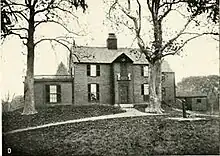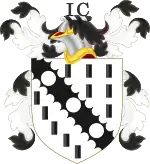John Cutt
John Cutt (1613 – April 5, 1681) was the first president of the Province of New Hampshire.

John Cutt | |
|---|---|
| President of New Hampshire | |
| In office 1680–1681 | |
| Succeeded by | Richard Waldron |
| Personal details | |
| Born | John Cutt Wales |
| Died | April 5, 1681 (age 68) Portsmouth, New Hampshire |
| Spouse(s) | Hannah Starr, Ursula |
| Children | John, Elizabeth, Hannah, Mary, Samuel |
| Occupation | President (Governor) of colonial New Hampshire and merchant, magistrate, councilor. |
| Signature | |
Cutt was born in Wales, emigrated to the colonies in 1646, and became a successful merchant and mill owner in Portsmouth, New Hampshire. He was married to Hannah Starr, daughter of Dr. Comfort Starr of Boston, a founder of Harvard College and a surgeon who emigrated from Ashford, Kent, England.[2] Starr is buried in King's Chapel Burying Ground, Boston.
On January 1, 1680, John Cutt became the first president of the royal Province of New Hampshire, when New Hampshire was first separated from the Massachusetts Bay Colony. Cutt was the head of the seven-member royal provincial council.[3] An early copy of the document appointing Cutt and his council is now preserved by the State of New Hampshire.[4]
Soon after his appointment he fell ill. On March 1, 1681, the provincial Council and General Assembly designated March 17, 1681, as a Fast Day, "A day of public fasting and prayer."[5] The Council and Assembly believed Cutt's illness and the recent sighting of a comet were signs of "divine displeasure"; the fast day was unsuccessful, as John Cutt died on April 5, 1681.[5]
After his Cutt's death, Richard Waldron was named acting president.
Family

John Cutt was accompanied from Wales to Portsmouth by two brothers, Richard and Robert.[6] A descendant of brother Robert Cutt was Hon. Hampden Cutts (as the family styled themselves, with the 's' in succeeding generations) of North Hartland, Vermont. Hampden Cutts married Mary Pepperrell Sparhawk Jarvis, daughter of William Jarvis of Weathersfield, Vermont, and the man who introduced merino sheep to America. Cutts's wife Mary Jarvis was herself a descendant of John Cutt through her father.[7][8]
References
- C.S. Gurney, Portsmouth, Historic and Picturesque, (1902) after p.54 at: https://archive.org/stream/portsmouthhistor00gurn#page/54/mode/2up
- "Harvard Charter of 1650, Harvard University Archives, harvard.edu". Hul.harvard.edu. Archived from the original on January 11, 2011. Retrieved October 27, 2010.
- Aside from Cutt, the other members of the Council were Richard Martin, William Vaughan and Thomas Daniel of Portsmouth, Richard Waldron of Dover, John Gilman of Exeter and Christopher Hussey of Hampton.
- "State of New Hampshire, Executive Council, History of the Executive Council nh.gov/council/history.html". Nh.gov. Archived from the original on October 6, 2010. Retrieved October 27, 2010.
- Gilbreth, Donna (1997). "Fast Day". New Hampshire Almanac. New Hampshire State Library. Archived from the original on January 2, 2011. Retrieved August 26, 2020.
- "The Cutt Family, Brewster's Rambles about Portsmouth". Seacoastnh.com. Archived from the original on September 24, 2015. Retrieved October 27, 2010.
- The New England Historical and Genealogical Register, Henry Fitz-Gilbert Waters, Boston, 1880. New England Historic Genealogical Society. 1889. p. 450. Retrieved October 27, 2010 – via Internet Archive.
hampden cutts holyoke.
- Bolton, Charles Knowles (May 2006). The Founders: Portraits of Persons Born Abroad Who Came to The Colonies, Charles Knowles Bolton, Boston Athenaeum, Boston, 1919. ISBN 9781425492274. Retrieved October 27, 2010.
External links
- Genealogy of the Cutts family in America (1892)
- New Hampshire Almanac: History
- John Cutt, Seacoast NH
- Commission of John Cutt, 1680, The Avalon Project
- Gravestone of Hannah Cutt (nee Starr), wife of John Cutt
- The Origin of Robert, Richard and John Cutt, Collections, Historic and Miscellaneous, John Farmer, 1824